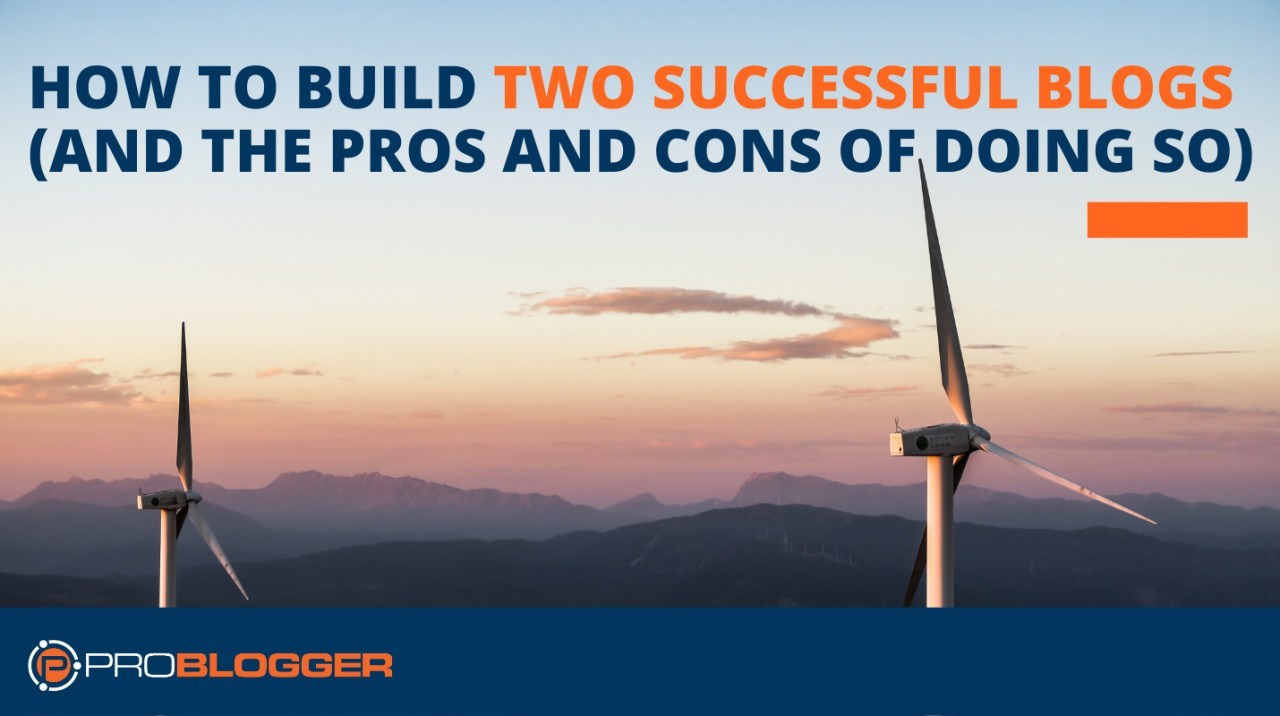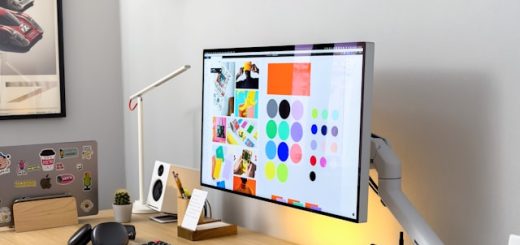The Pros and Cons of Having Multiple Blogs

This post is based on episode 188 of the ProBlogger podcast
As you probably know, I have two main blogs – ProBlogger and Digital Photography School. And I’m very fortunate to be in a position where I could devote all of my time to either one of them and still earn a full-time income.
But while are definitely benefits in having two well-established blogs, those benefits come at a cost.
So this week I want to talk about both the benefits and the costs of having multiple blogs so you can decide whether it’s worth doing.
But first, I need to talk about how these two blogs came to be, and about the other blogs that were discarded along the way to get to this point.
My first blog
In 2002 I started The Living Room, where I blogged about my experience of being involved in a new church (which was also called “The Living Room”). And on that blog I talked about the history of the church, as well as other aspects of my life – life in Australia, politics, television, movies, sport, blogging, photography, getting married, and so on.
Now back then it was okay to cover multiple topics on the same blog, which is why I did it. And at the time my readers didn’t seem to mind, either. But as blogging matured, and people started focusing on specific niches, things became a little tense on The Living Room.
A lot of my readers wanted to learn about specific things (the church, photography, blogging, etc.), and weren’t really interested in anything else. I felt compelled to serve everyone’s needs, which meant I often had thoughts along the lines of, Well, I wrote about blogging yesterday, so I can’t write about it again tomorrow. I’ll need to write about another topic to serve my other readers.
I started to feel constrained, and that I no longer had the freedom to write the way that I wanted to. So I looked at the categories I wrote about on The Living Room and started new blogs based on some of those categories.
The rest of my blogs
My first niche blog was a camera review blog I started in late 2003. It was also the first blog I made money from by putting some Adsense ads on and referring people to Amazon with affiliate links.
It worked really well. So well, in fact, that I tried to replicate my success by starting a camera phone review blog. (This was back in the day when phones with cameras were just coming out.) I even started a blog where I reviewed printers, thinking Well, they’re kind of related to photography. I even started a blog on the 2004 Olympic Games being held in Athens.
And then I created ProBlogger and started talking about how I made money from my blogs (and how others could make money from theirs).
At this point I had four or five blogs going. The camera review blog was making good money, and the camera phone blog was doing okay. But ProBlogger completely took off, largely because it was the only blog devoted to making money from blogging at the time. And when I announced I was making a six-figure income from blogging, that became big news and a lot of other blogs linked to it.
It was the tipping point for ProBlogger. A few months in, it had a sizeable audience and was making a bit of money. And I was experimenting with different ways to monetize it, which I’ve talk about in a recent blog post.
But the number of blogs I was involved in quickly grew when I started a blog network called The Breaking News blogs with some friends over in New Zealand. And by 2005 the number was up to around 30 blogs.
A reality check
But out of those 30 or so blogs, only three were doing well. ProBlogger was doing exceptionally well, the camera review blog was doing well, and the camera phone blog was doing okay. (My Olympic Games blog did really well during the event, but then quickly died away.)
But while the review blogs were going reasonably well, I wasn’t enjoying writing for them. And if I wanted to keep blogging then I really needed to find a way to enjoy it. At this point I was starting to make a decent income from ProBlogger, and so I decided to kill off some of the other blogs so I could focus on it more.
The first thing I killed off was the Breaking News blog. This freed up a lot of my time, which I used to grow ProBlogger even more. And in 2006 I killed off the camera review and camera phone blogs.
That was a big risk, because at the time those two blogs were my main source of income (around $100,000 a year). But they were killing me. I’m neither a techie nor a review kind of guy, and so they were kind of soul-destroying. I wasn’t overly satisfied with the quality of the posts, either.
So I went from reviewing cameras to blogging about how to take better photos – something I was far more passionate about. And I knew I had a better change of building an audience with a ‘how to’ blog more than with a review blog.
But as I said, I had ProBlogger to fall back on while I was setting up what would become Digital Photography School. It would have been much harder to establish them both at the same time. So even though your goal may be to have multiple blogs, you may want to focus on them one at a time. (That being said, you should definitely grab the domain names and social media accounts as soon as possible.)
The slow road to success
The first year or two of Digital Photography School were tough. I naively thought it would grow as quickly as ProBlogger had, but I was wrong. The people who read my original photography blog weren’t interested in the new blog. And hardly any of my ProBlogger readers were interested in it either, which was understandable. I had to work really hard on writing content and growing the archive, along with growing its traffic by writing sharable content, networking, writing guest posts and collaborating with other bloggers.
And back then I was doing pretty much all of it – the writing, the promoting, the comment moderation, the partnerships and the monetization. I almost gave a couple of times because it wasn’t growing as quickly as I wanted it to. Still, it was growing. And I realized that if I could grow it by 10% a month (or even every two or three months), it would eventually have a significant amount of traffic that could help me generate a significant income.
And that’s exactly what happened. Digital Photography School is now around eight or nine times larger than ProBlogger. And while I still put a lot of time and effort into ProBlogger because it’s a personal brand (which I’ll talk about soon), my main business focus is Digital Photography School.
The pros and cons
Now, let’s talk about the benefits and downsides of having multiple blogs.
The first benefit is having the freedom to write about more than one topic. We generally write about things we’re passionate about. And chances are you have more than one passion in your life. Having multiple blogs allows you to write about each of your passions without ‘muddying the waters’ or feeling you have to write about a certain topic just to maintain a balance.
The second benefit of having more than one blog, at least from a business perspective, is you can diversify your income. Having multiple income sources is always a good idea in case one of them suddenly dries up. And like every other business venture, there are no guarantees that your blog will last forever.
Out of the 30 or so blogs I’ve had over the years, only two of them worked out to any extent. But as you now know, ProBlogger and Digital Photography School grew from other blogs I’d started earlier. So another benefit of having multiple blogs is you get to try out different ideas and see which ones have potential and which ones will probably never work.
But while having multiple blogs can be beneficial, there are also some drawbacks.
The first is having to spread your focus and attention across multiple blogs. When I was writing content for my 30-odd blogs, the quality of that content wasn’t great. In fact, most of it was pretty boring. A lot of the time I was just rehashing news from camera and printer manufacturers and trying to get as much traffic and as many AdSense clicks as I could. It wasn’t interesting, wasn’t meaningful, and wasn’t really useful to anyone.
Another drawback from having multiple blogs is the risk of burnout. When I had those 30 blogs I was working 12–16 hours a day writing content for them. (I was trying to write new content for them every day, which wasn’t realistic.) Reducing the number to just two really helped in terms of my work-life balance, my health, and my passion for what I was doing.
And of course, it’s hard to create good content when you’re feeling burned out. So you end up writing not only less content but also less valuable content, which can do more harm than good.
How to decide
Ultimately, whether you should have multiple blogs or not comes down to your goals and what you want to achieve.
If you want to build a business empire and become a billionaire, then focusing all your efforts on one blog and growing that business might be the way to go.
I sometimes wonder whether I could focus solely on ProBlogger or Digital Photography School and make it an even bigger business. And there’s a good chance I could.
The thing is, I don’t want to be a billionaire. Nor do I want to have a business with hundreds of employees. I simply wanted to create something small that’s meaningful not only to me but also to my readers. And I like to think I’ve done that – twice.
If you do decide to have multiple blogs, I strongly suggest you launch them one at a time rather than all at once. It will allow you to focus on each one as you build the systems, procedures and perhaps even teams you need to get it running relatively independently.
(Yes, as your blog gets bigger you will probably need a team of people to help you. It’s the only way you’ll be able to scale it to any extent. My first writers were guest writers, but I soon built a team of paid writers to help create the content. These days I have people who look after various aspects of both businesses including emails and customer support, design and tech, and even managerial work.)
One of the best things I ever did was to make Digital Photography School a non-personally branded site. While I may write the occasional sales-type post, 99% of the content is written by a team of writers and edited by someone else. Which means I don’t need to do much personally to keep the site running.
ProBlogger is a different story. My face is on the front page, and you see and hear me in videos and on the podcast. It’s branded much more personally, and so I need to do a lot more to keep it running. I enjoy it, so it’s not a problem. But it would be much more difficult if Digital Photography School was personally branded as well.
Branding is something you should consider if you’re going to set up multiple blogs. Personally branding them all means you will have to do a lot of the work yourself, which means you won’t be able to scale it as much as you would a blog that isn’t personally branded.
Having a blog that isn’t personally branded also means you will have a much better chance of selling it (if you ever decide to).
Finally, if you’re going to be running multiple blogs then you need to establish timetables and routines so you know what you should be doing at any given time. I’m not the most organized person, and I’m not great with diaries and the like, so this is something I’ve really had to work on.
And I’m just talking about writing blog posts. You also need to arrange times to write newsletters, have team meetings (if you have one), record podcast episodes (again, if you have one), run Facebook Live sessions, and so on. Not only does it help you keep them going, it helps your readers predict when new content is coming.
Over to you
I hope what I’ve talked about today has helped you decide whether to have multiple blogs, and how to get them all up and running.
Do you currently have more than one blog? Are you planning on having more blogs in the long term? What will they focus on? Let us know in the comments.
Image credit: Jason Blackeye







